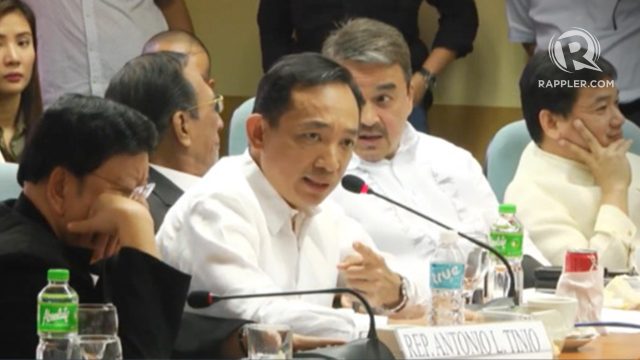SUMMARY
This is AI generated summarization, which may have errors. For context, always refer to the full article.

MANILA, Philippines – Why should Filipinos pay P100 million for the federalism campaign, when there is no certainty that it would materialize?
This was one of the difficult questions thrown at the Department of the Interior and Local Government (DILG) as it defended its budget for 2019 at the House of Representatives on Wednesday, August 29.
“Bakit gumagastos ang taumbayan para sa pangyayaring malabong mangyari in the first place?…Mukhang waste of funds ang nakikita natin dito,” ACT Teachers Representative Antonio Tinio asked.
(Why is the Filipino people spending for something that has bleak hopes of being realized in the first place?…It looks like a waste of funds.)
Where the question came from: Tinio was asking for updates on how the DILG has spent its P100 million budget to campaign nationwide for President Rodrigo Duterte’s landmark project.
According to DILG Assistant Secretary Jonathan Malaya, they have only spent around P10 million as of August, which, as lawmakers pointed out, is far from the halfway point even though there are only 3 months left for 2018.
Malaya heads the federalism campaign office and also serves as the spokesperson of the DILG.
Tinio then asked how the DILG plans to spend the remaining P90 million, and Malaya said they were basing their campaign on the draft constitution prepared by the Constitutional Consultative Committee (Con-Com).
Why it’s still uncertain: There is no guarantee that the Con-Com draft constitution would replace the current 1987 Constitution. It isn’t also not certain whether lawmakers would agree to having a new constitution.
While the Con-Com draft has been transmitted to both the House of Representatives and the Senate, lawmakers have yet to agree on how the draft charter’s details should be fleshed out. (DOCUMENT: Con-Com draft constitution submitted to Duterte)
There was though a resolution filed before the House plenary expressing intent of lawmakers that the House and Senate should convene as a Constituent Assembly.
The Senate, meanwhile, has not passed a counterpart measure, as senators raised concern on the manner of voting.
One of the first policy pronouncements of Speaker Gloria Macapag Arroyo was her agreeing to conduct separate voting for both houses of Congress in amending the constitution.
She said: “If you want to move forward, you have to be realistic. Better to move forward and achieve something than to be very stubborn and achieve nothing.”
DILG’s defense: According to Malaya, the DILG has only spent P10 million because it has been waiting for the Con-Com’s draft, which was finalized only in July.
He then defended the use of the draft constitution’s contents as their campaign materials, saying that they have only been campaigning, so far, in “broad strokes” as they acknowledge that there were still no final details.
In a text message to Rappler, Malaya added that federalism can be seen as just like the Bangsamoro Organic Law, which began with the recommendation of the Bangsamoro Transition Commission.
“Now, we use the ConCom draft in our campaign since it’s the President’s model and from there we can have a healthy debate which will lead to a better federal charter,” he added. – Rappler.com
Add a comment
How does this make you feel?
There are no comments yet. Add your comment to start the conversation.